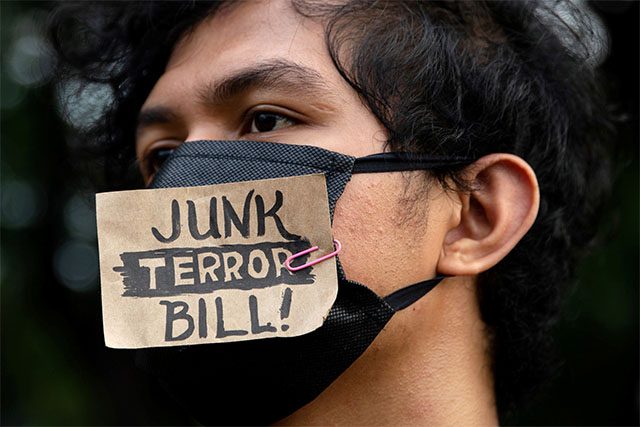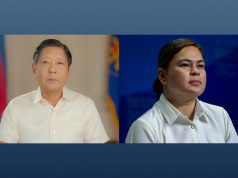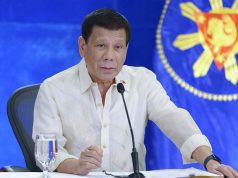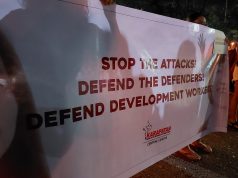
Calls to veto the anti-terror bill were renewed as Malacañang said that the proposed measure is now with the office of Executive Secretary Salvador Medialdea and up for “final review.“
Presidential spokesperson Harry Roque on Thursday said that the proposed Anti-Terrorist Act of 2020 has been transmitted to Medialdea from the Office of the Deputy Executive Secretary for Legal Affairs (DESLA).
“This means there is now a memorandum recommending a course of action for the president,” he said in a virtual press briefing.
Roque added that the recommendation from DESLA may be subject to Medialdea’s approval. After which, it would be brought to the desk of the chief executive for his perusal.
The proposal, which has provisions seen to potentially curtail constitutionally-protected civil liberties and stifle dissent, will automatically lapse into law on July 9 and repeal the Human Security Act of 2007 if Duterte fails to veto it in a week.
The hashtag #VetoTerrorBill has then gained traction on local Twitter as different groups and individuals expressed opposition against the passage of the proposed measure.
Movement Against Tyranny reminded the public that the anti-terror bill will lapse into law “less than a week” and urged the bill dissenters to make their voices be heard online.
Less than a week to go before the anti-terror bill lapses into law. Join the Twitter rally for Duterte to #VetoTerrorBill and for the nation to #JunkTerrorBillNow. pic.twitter.com/h7zpzWetuq
— Movement Against Tyranny (@stoptyrannyph) July 2, 2020
A Twitter user shared graphics summarizing some of the bill’s controversial provisions such as the definition of terrorism and actions that can be taken if one is a suspected terrorist, which includes secret surveillance.
never forget. #JUNKTERRORBILLNOW #VetoTerrorBill pic.twitter.com/e7CeDIsqzf
— ً (@sy6lo) July 2, 2020
Raoul Manuel, president of the National Union of Students of the Philippines, likewise urged the public to join the social media actions to oppose the measure—which he called Duterte’s “undeclared Martial Law.”
The Terror Bill is now in Du30's hands. He has 3 options:
1. Sign it
2. Let it lapse into law by July 9.
3. Veto (or reject) it.If he doesn't choose option (3), he will only push more people to act vs his undeclared Martial Law.
Join the soc med action later!#VetoTerrorBill pic.twitter.com/TddLwvg80Q
— Raoul Manuel (@iamRaoulManuel) July 2, 2020
Philip Jamilla of human rights group Karapatan shared a video of United Nations Special Rapporteur on counterterrorism and human rights Fionnuala Ní Aoláin saying that the anti-terror bill is “susceptible to abuse.”
“Why #VetoTerrorBill now? United Nations Special Rapporteur on counterterrorism and human rights Fionnuala Ní Aoláin says the Anti-Terrorism Bill’s ‘overbroad and vague’ definition of terrorism is ‘susceptible to abuse’ and inconsistent with international human rights instruments,” he wrote.
Why #VetoTerrorBill now? United Nations Special Rapporteur on counterterrorism and human rights Fionnuala Ní Aoláin says the Anti-Terrorism Bill's "overbroad and vague" definition of terrorism is "susceptible to abuse" and inconsistent with international human rights instruments. https://t.co/1xwtKjxyof
— Philip Jamilla (@pmjamilla) July 2, 2020
Another Twitter user re-shared a series of infographics to help Filipinos understand why it should be a cause of concern.
“There are seven days left until the Anti Terror Bill lapse into a law. To those who still have no idea about this, kindly take some time reading the photos attached. Let us not turn a blind eye. Use your voice to speak up now. #JUNKTERRORBILLNOW #VetoTerrorBill,” she wrote.
There are seven days left until the Anti Terror Bill lapse into a law. To those who still have no idea about this, kindly take some time reading the photos attached. Let us not turn a blind eye. Use your voice to speak up now. #JUNKTERRORBILLNOW #VetoTerrorBill pic.twitter.com/VeOfpesNR8
— leticia (@triziee_) July 2, 2020
Highly controversial
The proposed anti-terror bill, which has been previously certified as “urgent” by Duterte, has provisions deemed to be “contrary to the Constitution,” the highest law of the land.
These include the legalization of wiretapping, granting of warrantless arrests without redress of grievances and having a vague definition of terrorism.
Critics of the measure said that while it does not stop people from dissenting or criticizing the government “in essence,” it only applies if those activities “are not intended to cause death or serious physical harm to a person, to endanger a person’s life, or to create a serious risk to public safety.”
United Nations rights chief Michelle Bachelet similarly called on Duterte to reject the bill as it will “heighten” the international body’s concerns about the “blurring of important distinctions between criticism, criminality and terrorism.”
She urged for the Philippine leader to instead “initiate a broad-based consultation process to draft legislation that can effectively prevent and counter violent extremism—but which contains some safeguards to prevent its misuse against people engaged in peaceful criticism and advocacy.”









